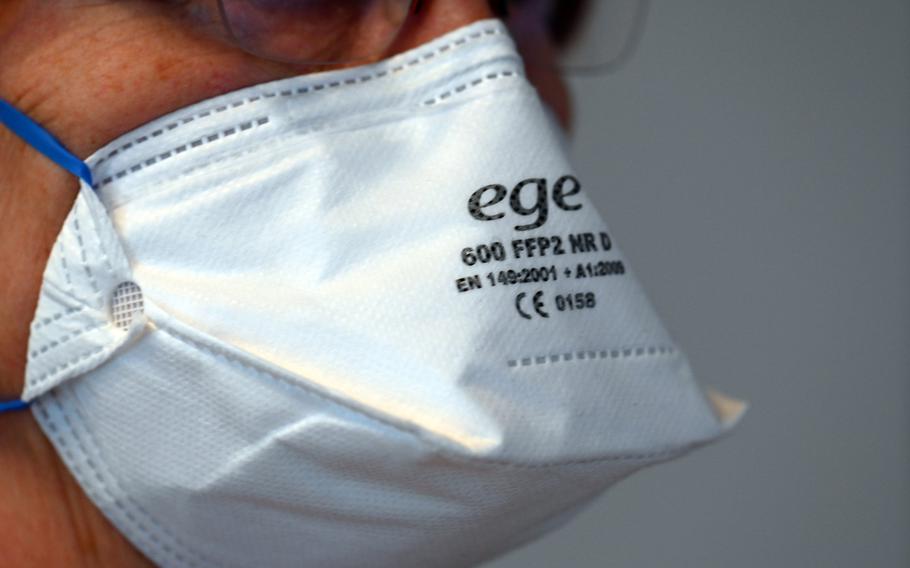Europe
Here’s what you need to know about Germany’s new face mask rules
Stars and Stripes January 23, 2021

Medical-grade masks, like this FFP2 version, will be required across Germany starting Monday, Jan. 25, 2021, while shopping and using public transportation. (MICHAEL ABRAMS/STARS AND STRIPES)
Stars and Stripes is making stories on the coronavirus pandemic available free of charge. See other free reports here. Sign up for our daily coronavirus newsletter here. Please support our journalism with a subscription.
KAISERSLAUTERN, Germany – Medical-grade masks will be required across Germany starting Monday, but different states have different rules about which ones can be worn and military officials haven’t said if the new requirements will apply on U.S. bases.
Masks that can be worn while shopping, using public transportation, going to the doctor, attending religious services, or in any public venue that is likely to be heavily trafficked, are FFP2 or FFP3 masks, KN95 or N95 masks, and surgical masks, also known as OP masks.
FFP2 or KN95/N95 masks have been mandatory in Bavaria since Jan. 18. Germany's largest state, which is home to USAG Bavaria and USAG Ansbach, does not allow surgical masks.
Surgical masks look similar to lower-grade masks that don't meet the standards for medical-grade face coverings. They must have multiple layers of fabric, a metal strut that sits across the nose, and say on their packaging that they are type II or III and CE rated, Germany’s Federal Institute for Medicines and Medical Devices says on its website.
Type I surgical masks are not medical-grade.
FFP2 or FFP3 masks are said to offer the best protection against the coronavirus. They shield the wearer and those nearby from larger particles found in the mouth and nose, called droplets, and from smaller particles called aerosols, the institute says. KN95 or N95 provide the same protection.
Particles can travel about six feet after they’ve been exhaled, which is why that has become the social distancing norm to reduce the risk of infection. Aerosols also travel several yards and linger in the air longer than droplets.
Baden-Wuerttemberg allows surgical masks in most public places but requires an FFP2 or KN95/N95 mask in hospitals or care homes.
Those masks are more expensive than surgical masks, which, according to the medical devices institute, protect from droplets and aerosols to a lesser extent.
Cloth masks are only recommended for personal use as how well they filter out droplets and aerosols depends on how they are made. Plastic face shields do not filter out particles, the institute says.
Not wearing a mask in Rheinland-Pfalz, home to Ramstein and Spangdahlem air bases and numerous Army installations, can lead to a fine of at least 50 euros, documents seen by Stars and Stripes show.
It’s unclear if wearing the wrong mask would also result in a fine, or who is authorized to check whether a mask meets the new requirements and impose a fine.
But German officials have not been shy in the past about punishing people for breaking the coronavirus rules.
In the state of Hessen, which includes USAG Wiesbaden and Frankfurt International Airport, coronavirus fines totaling over 1 million euros were imposed on more than 11,000 people in 2020, the Giessener Anzeiger newspaper reported.
And in the spring, four U.S. soldiers in Rheinland-Pfalz were fined 100 euros each for breaking social distancing laws – they were riding in a car together.
Stars and Stripes reporter Karin Zeitvogel contributed to this report.
Kloeckner.marcus@stripes.comSvan.jennifer@stripes.com Twitter: @stripesktown